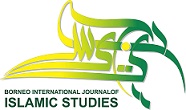The Constitutional Court Decision and Islamic Philanthropy Movements: Analysis of Zakat Organizations Legality in Samarinda
Abstract
As the capital of East Kalimantan province, Samarinda city government has adequate access to ensure the Legality of zakat management organizations in its jurisdiction. However, many community-based zakat agencies still carry out their activities without state license. Otherwise, the Constitutional Court Decision Number 86/ PUU-X/2012 obliges these zakat agencies to get the Ministry of Religious Affairs permit based on the National Amil Zakat Agency (BAZNAS) recommendation, in this case, the BAZNAS of Samarinda. This article focuses first on the legal implication of the Court’s decision which confirms the constitutionality of the zakat agencies' licensing requirement in Indonesian Zakat Law. Second, it probes the Samarinda community-based zakat agencies' stance on unlicensed activities and factors affecting their compliance with the Court's decision. Using socio-legal method, this article finds that the Court has established a norm that every zakat management organization must obtain the state's license as long as they operate within the jurisdiction of BAZNAS. Hence, it is considered illegal when community-based zakat agencies in Samarinda manage zakat unlicensed because every corner of the city is arguably within reach of BAZNAS Samarinda operation. Nevertheless, the Court's ruling is not observed by the society in Samarinda because they build their own social construction in implementing the Islamic teaching of zakat. Their stance is mainly influenced by religious motives instead of legal compliance, as well as the hereditary obedience to religious figures. Although many zakat agencies are not licensed, the society always feels benefited and facilitated by their work of collecting and distributing zakat in their region.
Keywords: Amil zakat, legality, Constitutional Court, Samarinda
References
Ali, Mahrus. “Pemetaan Tesis Dalam Aliran-Aliran Filsafat Hukum Dan Konsekuensi Metodologisnya.” Jurnal Hukum Ius Quia Iustum 24, no. 2 (2017): 213–31.
Andayani, Trisni et al. Pengantar Sosiologi. 1st ed. Yayasan Kita Menulis, 2020.
Benhabib, Seyla. “Dialogic Constitutionalism and Judicial Review.” Global Constitutionalism, 2020, 506–14. https://doi.org/10.1017/S204538172000012X.
Canggih, Clarashinta et al. “Potensi Dan Realisasi Dana Zakat Indonesia.” Al-Uqud: Journal of Islamic Economics 1, no. 1 (2017): 14–26.
Enayat, Taha et al. “A Computational Approach to Homans Social Exchange Theory.” Physica A, no. 597 (2022): 1–15.
Faiz, Pan Mohamad dan M. Lutfi Chakim. Peradilan Konstitusi: Perbandingan Kelembagaan Dan Kewenangan Konstitusioanal Di Asia. Depok: Rajawali Pers, 2020.
Fauzia, Amelia. “Islamic Philantrophi in Indonesia: Modernization, Islamization, and Social Justice.” Austrian Journal of South-East Asian Studies 10, no. 2 (2017): 223–36. https://doi.org/doi 10.14764/10.ASEAS-2017.2-6.
Fahrudin, Nanang dan Sri Hastjarjo. “Analysis of Social Harmonization Process in the Inter-Religion Relation from the Perspective Cultural Communcation: An Apprach Using Relation Dialectics and Structural Functionalism.” Advances in Social Science, Education and Humanites Research 260 (2018): 131–35.
Fuadi, Ariza. “Towards the Discourse of Islamic Philantrophy for Social Justice in Indonesia.” Jurnal Ilmu-Ilmu Keislaman Afkaruna 8, no. 2 (2012): 92–102. https://doi.org/DOI 10.18196/AIIJIS.2012. 0008. 92-102.
Gobel, Yulia Puspitasari. “Pemulihan Ekonomi Indonesia Pasca Pandemi Covid-19 Dengan Mengkombinasikan Model Filantropi Islam Dan Ndeas Model.” Jurnal Tabaru’: Islamic Banking and Finance 3, no. 3 (2020): 209–23.
Hanifah, Rokhmatun et al. “Tantangan Hukum Peer to Peer Lending Dalam Mendorong Pertumbuhan Industri Financial Technology.” Pandecta 16, no. 2 (2021): 195–205. https://doi.org/http://dx.doi.org/10.15294/pandecta.v16i2.25712.
Imawan, Dzulkifli Hadi et al. “Islamic Philantrophy and Civil Society Development Solution in Indonesia.” Advances in Economic, Business and Management Research 168 (2018): 416–19.
Iskandar, Azwar et al. “Islamic Philantropy and Poverty Reduction in Indonesia: The Role of Integrated Islamic Social and Commercial Finance Institution.” Al-Ihkam: Jurnal Hukum Dan Pranata Sosial 16, no. 2 (2021): 274–301. https://doi.org/http://doi.org/10.19105/al-ihkam.v16i2.5026.
Izadi, Arezoo et al. “Structuralism Functionalism, Social Sustainability and the Historic Environment: A Role for Theory in Urban Regenaration.” The Historic Environment: Policy and Practice 11, no. 2 (2020): 158–80. https://doi.org/https://doi.org/10.1080/17567505.2020.1723248.
Jahar, Asep Saepudin. “Developing Islamic Philantrophy Fo Human Rightse: The Indonesia Experience.” Advances in Social Science, Education and Humanites Research 162 (2017): 1–4.
Kasri, Rahmatina Awalia and Adela Miranti Yuniar. “Determinants of Digilat Zakat Payments: Lessons from Indonesia Experience.” Journal of Islamic Accounting and Business Research 12, no. 3 (2021): 362–79. https://doi.org/DOI 10.1108/JIABR-08-2020-0258.
Mighfar, Shokhibul. “Social Exchange Theory: Konsep George C. Homans Tentang Teori Pertukaran Sosial.” Lisan Al-Hal 9, no. 2 (2015): 261–85.
Mochtar, Zainal Arifin. Kekuasaan Kehakiman: Mahkamah Konstitusi Dan Diskursus Judicial Activism Vs Judicial Restraint. Depok: Rajawali Pers, 2021.
Mochtar, Zainal Arifin dan Eddy O.S. Hiariej. Dasar-Dasar Ilmu Hukum. Jakarta: Red and white Publishing, 2021.
Ormerd, Richard. “The History and Ideas of Sociolocal Functionalism: Talcot Parsons, Modern Sociologal Theory, and the Relevance for OR.” Journal of the Operational Research Society 71, no. 12 (2021): 1873–99. https://doi.org/https://doi.org/10.1080/01605682.2019.1640590.
Reale, Filoppo. “Governing Innovation System: A Parsionian Social System Perpspective.” Technology in Society, no. 59 (2019): 1–8. https://doi.org/https://doi.org/10.1016/j.techsoc.2019.101174.
Shalihah, Fithriatus. Sosiologi Hukum. Depok: Rajawali Pers, 2017.
Sa’adah, Mazro’atus dan Uswatun Hasan. “The Common Goals of BAZNAS’ Zakat and Sustainable Development Goals (SDGs) According to Maqashid Al-Sharia Perspective.” Al-Ihkam: Jurnal Hukum Dan Pranata Sosial 16, no. 2 (2021): 302–26.
Soekanto, Soerjono. Pengantar Sosiologi. Jakarta: Raja Grafindo Persada, 2007.
———. Pokok-Pokok Sosiologi Hukum. Jakarta: Rajawali Pers, 1988.
Urbonavicius, Sagitus et al. “From Social Networking to Willingness to Discose Personal Data When Shopping Online: Modelling in the Contekxt of Social Exchange Theory.” Journal of Business Research, no. 136 (2021): 76–85. https://doi.org/https://doi.org/10.1016/j.jbusres.2021.07.031.
https://doi.org/https://doi.org/10.1016/j.physa.2022.127263.
Widiastuti, Tika et al. “Developing an Integrated Model of Islamic Social Finance: Toward an Effective Governance Framework.” Heliyon 8, no. 9 (2022): 1–10. https://doi.org/https://doi.org/10.1016/j.heliyon.2022.e10383.
Wiratraman, Herlambang P. “Penelitian Sosio-Legal Dan Konsekuensi Metodologisnya.” Surabaya, 2016.
Wiratraman, Herlambang P. dan Widodo D. Putro. “Tantangan Metode Penelitian Interdisipliner Dalam Pendidikan Hukum Indonesia.” Mimbar Hukum 31, no. 3 (2019): 402–18.
Law Number 23 of 2011 concerning Zakat Management
Decision of the Constitutional Court (MK) Number 86/PUU-X/2012.
Copyright (c) 2023 Bambang Iswanto, Miftah Faried Hadinatha

This work is licensed under a Creative Commons Attribution 4.0 International License.

.png)






